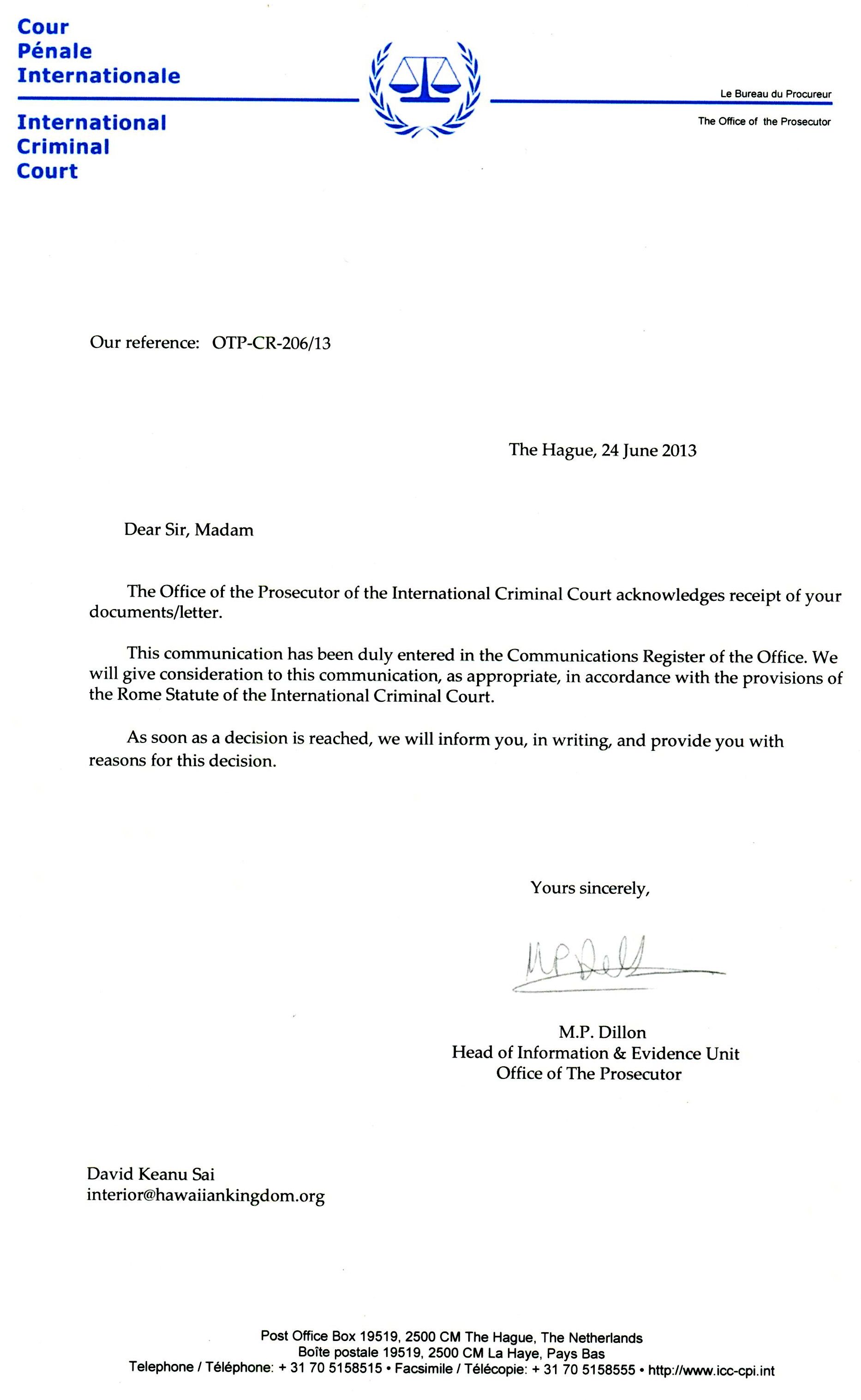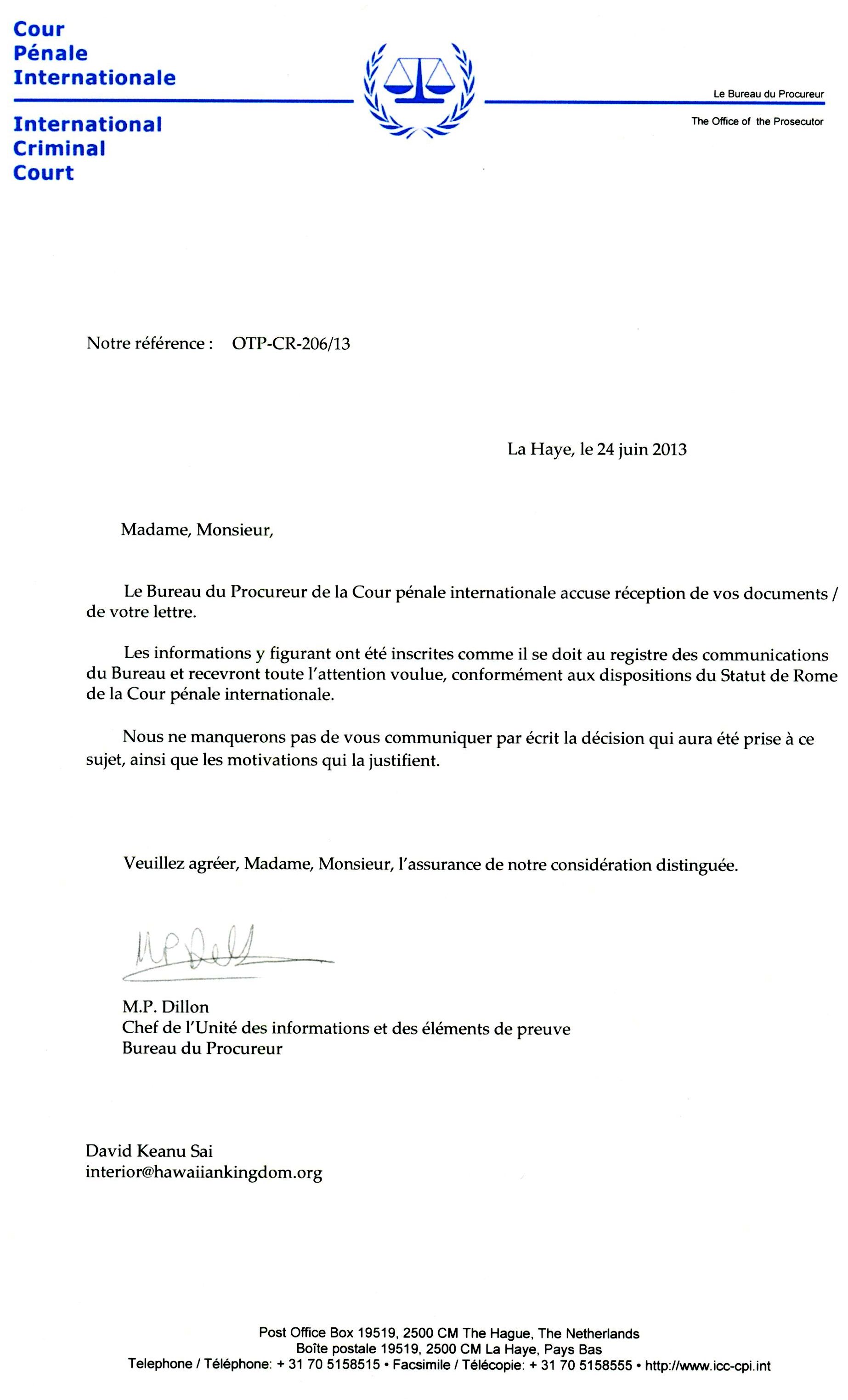On June 17, 2013, the International Criminal Court (ICC) received the Hawaiian Kingdom’s Referral to initiate criminal investigations and its Declaration extending the jurisdiction of the ICC to investigate war crimes committed on Hawaiian territory since July 1, 2002. Initially the ICC’s jurisdiction was limited to crimes committed after March 4, 2013 when it began its jurisdiction over the Hawaiian Islands. On June 24, 2013, the Office of the Prosecutor (OTP) acknowledged receipt of the communication and stated they “will give consideration to this communication, as appropriate, in accordance with the provisions of the Rome Statute of the International Criminal Court.”
The ICC can initiate an investigation from three sources or a combination of the three: first, from the United Nations Security Council; second, from the government of the State that granted jurisdiction to the ICC; and, third, from private parties who were victims of war crimes committed on the territory that the ICC has jurisdiction. According to the ICC Prosecutor’s Policies, “in response to referrals or communications, the Prosecutor will gather and assess relevant information until such point as he is satisfied that there is, or is not, a reasonable basis to proceed. The Prosecutor makes the determination as to whether there is a reasonable basis to proceed based on the three factors required by the Statute:
- the factual/legal basis: the information available provides a reasonable basis to believe that a crime within the jurisdiction of the Court has been or is being committed;
- the admissibility test: the case is or would be admissible (including on complementarity grounds) under Article 17;
- the interests of justice: taking into account the gravity of the crime and the interests of victims, there are nonetheless substantial reasons to believe that an investigation would not serve the interests of justice.”
Because the Hawaiian Kingdom is occupied and not a part of the territory of the United States, U.S. government officials who have committed war crimes within the territory of the Hawaiian Kingdom are not immune from prosecution by the ICC. According to the Rome Statute, Article 27—Irrelevance of official capacity:
- This Statute shall apply equally to all persons without any distinction based on official capacity. In particular, official capacity as a Head of State or Government, a member of a Government or parliament, an elected representative or a government official shall in no case exempt a person from criminal responsibility under this Statute, nor shall it, in and of itself, constitute a ground for reduction of sentence.
- Immunities or special procedural rules which may attach to the official capacity of a person, whether under national or international law, shall not bar the Court from exercising its jurisdiction over such a person.
In its Referral, the Hawaiian Kingdom provided evidence of the following war crimes under Article 8 of the Rome Statute that have and continue to be committed on Hawaiian territory since July 1, 2002.
- Article 8(2)(a)(iv)—Extensive…appropriation of property, not justified by military necessity and carried out unlawfully and wantonly
- Article 8(2)(a)(v)—Compelling a…protected person to serve in the forces of a [Occupying] Power
- Article 8(2)(a)(vi)—Willfully depriving a…protected person of the rights of fair and regular trial
- Article 8(2)(a)(vii)—Unlawful deportation or transfer or unlawful confinement
- Article 8(2)(a)(viii)—The transfer, directly or indirectly, by the Occupying Power of parts of its own civilian population into the territory it occupies, or the deportation or transfer of all or parts of the population of the occupied territory within or outside this territory
- Article 8(2)(b)(xiii)—Destroying or seizing the [Occupied State’s] property unless such destruction or seizure be imperatively demanded by the necessities of war
When evaluating the commission of a war crime, the Prosecutor will be guided by certain elements of the crime established by the ICC that need to be met. In addition to these elements, the ICC states:
- There is no requirement for a legal evaluation by the perpetrator as to the existence of an occupation of the territory of a High Contracting Party;
- In that context there is no requirement for awareness by the perpetrator of the facts that established the character of the occupation of the territory of a High Contracting Party; and
- There is only a requirement for the awareness of the factual circumstances that established the existence of an occupation of the territory of a High Contracting Party.
War crimes are not necessarily centered on the perpetrator or principal alone, but could include accessories to the crime. Accessories are persons who assist in the commission of the crime, whether before or after the crime was committed by the principal. An accessory is distinguished from an accomplice who is normally present when the crime is committed and has participated in some fashion. An accessory before the fact is a person who orders the commission of a crime or assists another person financially, emotionally, as well as providing physical assistance in order for the crime to be committed by the principal. An accessory after the fact is a person who conceals the commission of the crime in order to shield the principal. Conspiracy and the obstruction of justice are common terms associated with accessories.
The ICC Prosecutor’s Policies also provides, “The Office of the Prosecutor will strive to complete all analyses as expeditiously as possible in order to reach timely decisions whether to investigate. It is worth emphasizing that Article 15 provides a valuable avenue by which concerned individuals and organizations may furnish information to the Prosecutor, but he retains his independence under the Statute. In particular, imposing rigid timetables on this process of analysis would not be workable under the framework of the Rome Statute.”



Awesomeness!
We are getting closer!!!
As Dr. Sai has stated we needed to be thorough in what we do, we needed to make sure that we proceeded as our kupuna before us one step or one stroke of the paddle at a time to ensure that we remained on course and not miss anything for our destiny depended on it. Yes, we have had to be patient, but our patience and determination will prevail. As an affiliate of Laulima and Mr. Kale Gumapac, we have been in court on many occasion along with Dr. Sai and attorney Dexter Kaiama on behalf of many our clients. Our main focus and objective has been to prove to the courts that based on Dr. Sai’s research, our true history and International Law the rights of the Hawaiian people and the people of Hawaii have been violated for many years, that Hawaii is illegally occupied, that under the Geneva Convention War Crimes are continuing to be committed and the time has come for the International Criminal Court to finally step in. EO……..
“Because the Hawaiian Kingdom is occupied and not a part of the territory of the United States, U.S. government officials who have committed war crimes within the territory of the Hawaiian Kingdom are not immune from prosecution by the ICC.”
The above stated, it appears that the U.S. President with his
authority capable of exceeding beyond U.S. borders extending through
the U.S. Pacific Command could also be held accountable for war
crimes. I don’t think Pacific Command took that into account!
Awesome indeed!
Aloha kakou.
Does anybody know what has happened with the website “Maoliworld” as to why it has disappeared off the internet? This was a convenient resource with much historical data and special interest groups which will be sadly missed, are there any plans for a similar future social website in order to keep abreast of developments as they occur? Mahalo.
This is indeed good news! Way to go! A major breakthrough. Mahalo nui to Dr. Sai, et al for your diligence and persistence on behalf of the Hawaiian people.
I would like to get you news letter on email ernestreyes3@hotmail Can’t fine how to join mahalo ernest reyes sr
Aloha kaua e Ernest.
If you click on “reply” to any of the comments here you will be asked for your e-mail address, just scroll down and click-on “notify me of new posts.” Any subsequent topics will be delivered direct to your in-box. Aloha.
Aloha… i feel so blessed to be living in these exciting times… mahalo Dr. Sai for all that you do for our nation…. please make it better than what we think it could be… mahalo ke akua… mahalo na alii… mahalo na kupuna… mahalo all hawaii
Aloha
Really very good news to everyone, thanks for sharing such an informative information. Keep sharing like this related to the law and legal issues, i am very much interested in it.
Mahalo Dr Sai for all your hard work now we need to get U.S,Congress to seat Our Queen Lili’u Kalani free and the return of her SOVEREIGN NATION The KingDom of Hawai’i to all the People off the Hawaiian Islands
WE ARE BLESSED TO HAVE DR. KEANU SAI WORKING HARD OUT THERE TO SET THE PEOPLE OF HAWAII FREE FROM BEING ESTRANGED IN THEIR OWN LAND. MAHALO FOR ALL THE TIME AND PATIENCE YOU HAVE PUT IN FOR THE RETURN OF OUR COUNTRY. YOU WILL BE BLESSED ABUNDANTLY.